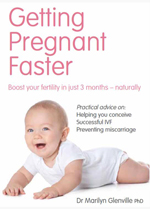
What is the cause?
What is the cause? From a medical point of view, infertility is believed to be caused by the following factors, and in these proportions.
Problem Percentage of cases:
| Ovulatory failure (including Polycystic Ovary Syndrome) | 20 |
| Tubal damage | 15 |
| Endometriosis | 5 |
| Male problems | 26 |
| Unexplained | 30 |
If the mathematics don’t add up, it’s because many couples experience more than one problem when trying to conceive: for example, you may suffer from endometriosis, but your partner may also have a low sperm count.
Interestingly, the most common cause of infertility is ‘unexplained’, which means that following thorough investigations, doctors can find no specific or identifiable medical problem at the root. But this is where a natural approach can come into play. If a couple fails to become pregnant, there is obviously something causing the problem. It’s no good labelling infertility ‘unexplained’. The answer is to look deeper – at lifestyle factors, nutritional deficiencies and even emotional elements.
What are your choices?
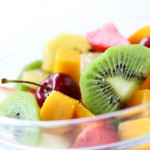
Natural treatment plans are, by their nature, extensive and really do need to be adjusted to suit your individual needs. I will, however, go through the most important points below. Remember that it takes at least three months for immature eggs (oocytes) to mature enough to be released during ovulation. It also takes at least three months for sperm cells to develop, ready to be ejaculated. This means that when you are trying to improve your fertility, you need to have a three-month period before conceiving. This is called ‘pre-conception care’ and it’s as important to take as much care during this period as it is during a pregnancy itself.
If you are going for IVF treatment or another assisted conception procedure, you should follow the recommendations listed below in order to increase the chances that the procedure will work.
Diet
Both you and your partner should follow the dietary recommendations explained in the Nutrition Section (The Foundation of Health) Although it goes without saying that a healthy diet is crucial to a successful pregnancy and a healthy baby, many people are unaware of the fact that diet can help to correct hormone imbalances that may affect your ability to conceive. There are also certain foods and drinks that are known to lower fertility.
Alcohol
Alcohol will affect both you and your partner. In fact, drinking any alcohol at all can reduce your fertility by half – and the more you drink, the less likely you are to conceive. One study showed that women who drank less than 5 units of alcohol a week (equal to 2 standard 175ml glasses of wine) were twice as likely to get pregnant within six-months compared with those who drank more.
Research has also shown that drinking alcohol causes a decrease in sperm count, an increase in abnormal sperm and a lower proportion of motile sperm. Alcohol also inhibits the body’s absorption of nutrients such as zinc, which is one of the most important minerals for male fertility.
As difficult as it may seem, you should eliminate alcohol from your diets for at least three months in order to give yourself the best possible chance of conceiving.
Caffeine
There is plenty of evidence to show that caffeine, particularly in the form of coffee, decreases fertility. Drinking as little as one cup of coffee a day can halve your chances of conceiving and just two cups a day increases the risk of a miscarriage. One study showed that problems with sperm: sperm count, motility and abnormalities, increase with the number of cups of coffee consumed each day. Once again, it’s important to eliminate all caffeine-containing food and drinks for at least three months before trying to conceive. That includes colas, chocolate, black teas and coffee, among other things.
Xenoestrogens
Xenoestrogens are essentially environmental oestrogens, coming from pesticides and the plastic industry. When you are trying to conceive, one of the most important things you need to do is to balance your hormones. It is extremely important to avoid anything that might cause an imbalance, and one of the main culprits is the xenoestrogens. One of the best ways to eliminate an excess intake of xenoestrogens is to eat as much organic produce as possible for the pre-conceptual period. For more information on how to control xenoestrogens see my book Getting Pregnant Faster.
Smoking
Smoking has definitely been linked with infertility in women. It can even bring on an early menopause, which is a particularly important consideration for older women who may be trying to beat the clock. Smoking can decrease sperm count in men, making the sperm more sluggish, and it can increase the number of abnormal sperm. With men, the effects on fertility are increased with the number of cigarettes.
Supplements
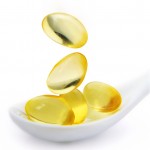
Scientific research has shown that certain vitamins and minerals can increase your chances of getting and staying pregnant. In order to maximise your chances of conceiving it is very important that you and your partner are in optimum health. By eliminating nutritional deficiencies and improving sperm production and mobility you can dramatically increase your chances of getting pregnant. In order to do this it is essential that you are obtaining the right nutrients and in the right quantities to enhance your success.
Supplements are necessary because even the best diet in the world mayl not contain all the nutrients you need to give you the best chance of conceiving.
Folic Acid
It is now known that folic acid can prevent spina bifida in your baby, and it is essential that you get plenty both before and during pregnancy. And that’s not all: folic acid is undoubtedly important, but it is just part of the very important B-complex family of vitamins that are necessary to produce the genetic materials DNA and RNA, not only of the egg but also the sperm. Together with vitamin B12, folic acid works to ensure that your baby’s genetic codes are intact. Remember: it’s not enough to take folic acid alone when you are trying to become pregnant. All of the B vitamins are essential during the pre-conceptual period. Research has shown that giving B6 to women who have trouble conceiving increases fertility and vitamin B12 has been found to improve low sperm counts.
Zinc
Zinc is the most widely studied nutrient in terms of fertility for both men and women. It is an essential component of genetic material and a zinc deficiency can cause chromosome changes in either you or our partner, leading to reduced fertility and an increased risk of miscarriage. Zinc is necessary for your body to ‘attract and hold’ (utilise efficiently) the reproductive hormones, oestrogen and progesterone.
And it’s equally important for your partner: zinc is found in high concentrations in the sperm. Zinc is needed to make the outer layer and tail of the sperm and is, therefore, essential for the health of your partner’s sperm and, subsequently, your baby. Interestingly, several studies have also shown that reducing zinc in a man’s diet will also reduce his sperm count.
Selenium
Selenium is an antioxidant that helps to protect your body from highly reactive chemical fragments called free radicals. For this reason, selenium can prevent chromosome breakage, which is known to be a cause of birth defects and miscarriages. Good levels of selenium are also essential to maximise sperm formation. Blood selenium levels have been found to be lower in men with low sperm counts.
Omega 3 Fatty Acids
These essential fats have a profound effect on every system of the body, including the reproductive system and they are crucial for healthy hormone functioning. Omega 3 fatty acids also control inflammation which may interfere with getting and staying pregnant. For men essential fatty acid supplementation is crucial because the semen is rich in prostaglandins which are produced from these fats. Men with poor sperm quality, abnormal sperm, poor motility or low count, have inadequate levels of these beneficial prostaglandins.
Many of the women I see in the clinic have been taking evening primrose oil supplements – an Omega 6 fatty acid – for years and have not been eating enough Omega 3 oils, or taking them in supplement form, to counterbalance this. Some women are also taking combinations such as Omega 3, 6, and 9 in supplement form because they have heard that we need a good balance of all the Omega fatty acids. This is true, but you have to take into account what your own levels may be in the first place. It is no good adding in more Omega 6 if you have already got enough or in fact too much in your body. (You can now have a blood test to tell you if you have the correct levels of Omega 3 to Omega 6 in your body see below). To check whether you have sufficient levels of Omega 3 please click Omega 3 Deficiency Test (at home finger prick blood)
Vitamin E
Vitamin E is another powerful antioxidant and has been shown to increase fertility when given to both men and women. Men going for IVF treatment with their partners have been given vitamin E, and fertilisation rates have, as a result, increased from 19 to 29 percent. It has been suggested that the antioxidant activity of vitamin E might make the sperm more fertile.
Vitamin C
Vitamin C is also an antioxidant, and studies show that vitamin C enhances sperm quality, protecting sperm and the DNA within it from damage. Some research has indicated that certain types of DNA damage in the sperm can make it difficult to conceive in the first place, or it can cause an increased risk of miscarriage if conception does take place. If DNA is damaged, there may be a chromosomal problem in the baby, should the pregnancy proceed. Whether or not DNA damage does have these effects has not been conclusively proven, but it’s worth taking vitamin C and the other antioxidants as a precautionary measure.
Vitamin C also appears to keep the sperm from clumping together, making them more motile.
One study has shown that women taking the drug clomiphene to stimulate ovulation will have a better chance of ovulating if vitamin C is taken alongside the drug. Clomiphene does not always work in every woman, but the chances are often increased when vitamin C is supplemented.
Beta-Carotene
This is the vegetable precursor to Vitamin A and is completely safe during pregnancy. Beta-carotene is a powerful antioxidant which helps to protect egg and sperm DNA from damage by harmful free radicals which can affect the quality of both the egg and sperm. Free radicals are highly unstable and set off a process called oxidation which can have harmful effects on the every cell in the body. Beta- carotene will be contained in your multivitamin and mineral.
L-Arginine
This is an amino acid found in many foods and the head of the sperm contains an exceptional amount of this nutrient, which is essential for sperm production. Supplementing with L-arginine can help to increase both the sperm count and quality.
Note: People who have herpes attacks (either cold sores or genital herpes) should not supplement with L-arginine because it stimulates the virus.
L-Carnitine
This amino acid is essential for normal functioning of sperm cells. According to research, it appears that the higher the levels of L-Carnitine in the sperm cells, the better the sperm count and motility.
Furthermore, by adopting a healthier lifestyle you will be more likely to prevent infertility problems which is discussed in detail in the rest of this ebook which you can read by clicking on Understanding Infertility ebook at The Natural Health Practice
Herbs

Agnus Castus (Vitex Agnus Castus)
This is the herb of choice for helping to restore hormone imbalance and increasing fertility. In one study 48 women diagnosed with infertility took agnus castus daily for three months, 7 of them became pregnant during that time and 25 of them regained normal progesterone levels.
Agnus castus is particularly helpful for those women who have a luteal phase defect (shortened second half of the cycle) or those with high prolactin levels, because it stimulates the proper functioning of the pituitary gland which controls the hormones.
Agnus castus works to restore hormonal balance and can be used where there are hormone deficits as well as excesses it:
- Regulates periods
- Restarts periods which have stopped
- Helps with heavy bleeding
- Increases the ratio of progesterone to oestrogen by balancing excess oestrogen.
Caution
You should not take any of the above herbs if you are taking, The Pill, Fertility drugs, HRT or any other hormonal treatment or other medication unless they are recommended by a registered, experienced practitioner.
I suggest that you follow this three month plan and do not try to conceive within that time. Why? Because when you follow the plan, your fertility will begin to increase. Everything needs to be working at optimum levels before you conceive, both to prevent a miscarriage, and to give you the best possible chance of having a healthy baby.
Case history
Susan and her partner were 30 and 31 respectively, and they’d been trying to have a baby for four years before coming to my clinic. They had been diagnosed with ‘unexplained fertility’ and had had four unsuccessful attempts at IUI. Susan had many problems with her periods: she had a regular cycle, but bled heavily with spotting and headaches before her period. At ovulation, her abdomen swelled up and she felt nauseous.
Both Susan and her partner were tested for infections and the tests came back positive to one infection, which was easily cleared up by antibiotics. Susan was deficient in a number of nutrients, including zinc, selenium, calcium and magnesium, and her partner had low zinc and high aluminium levels. I therefore recommended that he cut out tinned soft drinks and switch to an aluminium-free deodorant. Because I was concerned that the imbalance causing the problems with Susan’s cycle could also be a factor in her inability to conceive, I also used a combination of balancing herbs, such as agnus castus, to alleviate Susan’s spotting and heavy bleeding. Susan and her partner followed the three month programme and waited until their mineral levels were back to normal. Nine months from their first appointment day, they conceived, and, not surprisingly, had a baby another nine months later.
If you have been trying to conceive for six months
If you are under the age of 35 and have been trying unsuccessfully to conceive for six months, follow the dietary and supplement suggestions given below for three months. At the end of this period, begin trying to conceive again. Give yourself six months before embarking on any fertility treatments or investigation by your doctor or a gynaecologist.
If you have been trying for six months and are over 35, follow the recommendations but visit your doctor and ask for tests to begin during that first three-month period. If you are given a diagnosis of unexplained infertility, then try for six months on your own before going for medical treatment.
If you have been trying to conceive for 12 months or more
If you are under the age of 35, follow the suggestions below for three months. Then try on your own for six months before embarking on fertility tests.
If you have been trying for six months and are over 35, follow the recommendations but visit your doctor and ask for tests to begin during that first three-month period. If you are given a diagnosis of unexplained infertility, then try for six months on your own before going for medical treatment.
Tests
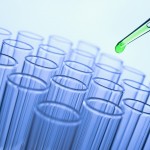
Fertility Mineral Deficiency Test with Supplement Programme (hair)
Find out what the mineral and heavy toxic levels are in your body
This test measures the deficiencies and excess levels of 12 different minerals (including calcium, chromium, cobalt, copper, iron, magnesium, manganese, phosphorus, potassium, selenium, sodium and zinc) and 6 heavy toxic metals (including aluminium, arsenic, cadmium, lead, mercury and nickel) that may be present in your body. Find out more – Fertility Mineral Deficiency Test with Supplement Programme (hair)
Online Personalised Supplement Assessment Programme
Discover what vitamins and minerals you need and should be taking
The analysis of this comprehensive questionnaire will give you a three monthly supplement programme to help balance any vitamin and mineral deficiencies you may have. Find out more – Online Personalised Supplement Assessment Programme
Female Hormone Test (saliva)
A total of eleven saliva samples are collected at home at specific times across one cycle, and sent to the lab for analysis. This simple test will chart the level of the hormones oestrogen and progesterone across the month, to work out a pattern that may reveal:
- early ovulation
- anovulation (no ovulation)
- problems with the phasing of the cycles, such as a short luteal phase (second half of the cycle)
- problems with maintaining progesterone levels
- high levels of testosterone
This test can be done even if you have irregular cycles. Find out more – Female Hormone Test (saliva)
Vitamin D Deficiency Test (at home blood finger prick)
With all the news in the press about the benefits of having good levels of vitamin D e.g. prevention of cancer, especially breast cancer, heart disease, Type 2 diabetes and osteoporosis it is important that you know whether or not you are lacking in this vital vitamin.
There is an increasing wealth of research linking low levels of this vitamin with infertility and immunological problems. It’s thought that Vitamin D plays a role in helping the body to maintain a pregnancy. By making mice deficient in vitamin D they can actually make them infertile. So if you’ve had a miscarriage or implantation is a problem, it is recommended that you check your level of vitamin D. Having an optimum level of vitamin D is also crucial for men as it has been associated with sperm motility and having a good amount of normal sperm. To find out whether you are deficient in Vitamin D Deficiency Test (at home blood finger prick).
Omega 3 Deficiency Test (at home blood finger prick)
If you want to find out if you are getting enough Omega 3 fatty acids from your diet and whether you have the correct balance of essential fatty acids.
Fish oil has also been shown to help prevent blood from clotting inappropriately so it can be beneficial to women in whom recurrent miscarriages have been linked to a clotting problem. The Omega 3 oils also control inflammation. If you want to find out if you are getting enough Omega 3 fatty acids from your diet and whether you have the correct balance of Omega 3 to Omega 6 essential fatty acids please click Omega 3 Deficiency Test (at home blood finger prick).
Find out if an infection is stopping you conceiving or staying pregnant
Infections in the vagina may have a serious impact on your ability to conceive and to hold on to a pregnancy. These infections may have existed for many years with low activity and often present no symptoms. If you are having problems conceiving or have suffered from successive miscarriage or IVF failure or if you have a persistent vaginal secretion it may be worth considering having an Infection Screen.
Infections in the prostate gland may affect both the quantity and quality of the sperm, so an infection screen is advisable, especially if everything else has been ruled out.
It is advisable to get this organised at a specialist clinic like my one as the NHS infection screens can be very basic. Find out more – Infection Screen (urine)
Semen Analysis (semen)
A comprehensive test to assess both quality and quantity of sperm
A good semen analysis not only assesses the sperm for quantity and motility but quality and is best done in a specialist clinic as the quality of the results can vary considerably.
A man can now have a comprehensive semen analysis to check for sperm count, motility, abnormal sperm, agglutination (sperm clumping) and sperm antibodies. It is then possible to use nutritional interventions to improve the semen analysis. Find out more – Semen Analysis
Sperm DNA Fragmentation Test (semen)
Find out if you have healthy sperm DNA
The success of a viable embryo depends to a certain extent on the genetic DNA of the egg and the sperm. The Sperm DNA Fragmentation Test is designed to check whether the DNA of the sperm is liable to fragmentation (the breaking down of some of the sperms DNA strands). There is always a small amount of DNA fragmentation in sperm but this can be overcome or repaired by the egg after fertilisation. However if the fragmentation is beyond a certain level, the repair process cannot compensate enough for the damage and normal embryonic development will stop, meaning that the pregnancy can’t continue.
A high level of fragmentation in sperm cells represents a cause of male infertility that a conventional semen analysis cannot detect. So a man may be told that his sperm is normal in terms of the count, motility and morphology but could have high levels of sperm DNA fragmentation. Results from the medical literature have confirmed that regardless of whether you are trying to conceive naturally or with the help of IUI or IVF, a high level of sperm DNA fragmentation will seriously compromise any possibility of a successful pregnancy. Find out more – Sperm DNA Fragmentation Test (semen)
Ovarian Reserve Test (blood)
Find out your egg store
This test measures AMH (Anti-Mullerian Hormone) which is a hormone made by your ovaries and helps your eggs mature each month. It is also important in the production of the female sex hormone oestrogen. The level of AMH indicates how well your ovaries are functioning and represents the quantity of your egg store. The lower the level of AMH the lower the fertility level is likely to be. This is a useful test also if you are thinking about doing IVF as a low levels has been shown in clinical trials to predict poor response to IVF treatment. In order for IVF or ICSI to work, your ovaries have to respond to the drug stimulation by recruiting a group of follicles, so if AMH is low then it is more than likely that the response will be poor.Measuring AMH is also useful for women with suspected polycystic ovary syndrome (PCOS) as the level is normally very high due to the greater number of follicles on the ovaries.This test can be done at any time of the cycle, even if you are not having a cycle. Click Ovarian Reserve Test (blood).
Immune Problems (blood)
Is your immune system stopping you getting and staying pregnant?
Immune problems may account for a large number of cases of unexplained infertility and pregnancy loss. Problems with the immune system occur when your body’s normal immune response to a pregnancy goes wrong. Your body naturally produces antibodies to fight off infection or foreign substances but during pregnancy your body should respond differently to an embryo and should form a protective blanket around it. Because half the baby’s DNA is not yours (it belongs to your partner or sperm donor), your immune system has, in effect, to quieten down in order to stay pregnant and not reject the baby. In some women, however, instead of protecting the embryo their immune system attacks it as if it were an infection or invading organism. Find out more – Immune Problems (blood)
There are a number of tests that can pinpoint whether this is a problem e.g. Natural Killer Cells and Antiphospholipid Antibodies
Natural Killer Cells (blood)
Natural killer cells are important. They make up 50 per cent of all white blood cells and are needed to control rapidly dividing cells like cancer. The theory is that some women produce too many natural killer cells which will aggressively attack any cells that grow and divide, offering protection against cancer but making pregnancy impossible. Find out more – Natural Killer Cells (blood)
Antiphospholipid Antibodies (blood)
Antiphospholipid antibodies (APAs) are the most common kind of abnormal immune system problem. Up to 15 per cent of women with a history of recurrent miscarriage have this syndrome – and a 90 per cent miscarriage rate, without treatment. And APAs can also prevent implantation, preventing pregnancy in the first place. Phospholipids are a sort of glue needed in early pregnancy. Some women, however, produce APA blood-clotting antibodies which attack cells that build the placenta and increase the risk of miscarriage.
Anticoagulants help to prevent clotting caused by APA and both low-dose aspirin and heparin (a blood thinner) are often prescribed. Supplements of omega 3 essential fats, vitamins C and E and garlic also help to thin the blood so you should not take these if you are on blood thinners. NB. Please note some of the recommended tests are only available in conjunction with a consultation at one of my clinics. Find out more – Antiphospholipid Antibodies (blood)
After three months you would then have a re-test in order to monitor your progress and adjust your supplement programme according to your new condition.
If you need help in obtaining any of the supplements, herbs or tests mentioned, click, Infertility options at The Natural Health Practice. They can supply all of them for you online or if you prefer to talk to somebody first you can also order by mail order on the telephone. The products supplied by this company are always of the highest quality.
Plan of Action
Nutrition
Ensure you are getting the right nutrition.Follow the dietary recommendations outlined in the free The Foundation of Health ebook For more information on the special dietary recommendations for fertility, read the rest of the ebook on Understanding Infertility ebook at The Natural Health Practice
Supplements
The supplement programme below should be taken for at least three months in order to achieve best results
Nutrients & amounts
| A good multi-vitamin & mineral supplement | Vitamin C with bioflavonoids as magnesium ascorbate | 1000mg | |
| Folic Acid | 400μg | Zinc | 30mg |
| Selenium | 100μg | L-carnitine | 100mg |
With all of the above for your partner, plus:
| L-arginine | 300mg |
| L-carnitine | 100mg |
| L-taurine | 100mg |
To avoid having to purchase numerous supplements for all of the above and to make the process easier, I have put together a supplement programme which contains all the nutrients mentioned above and in the correct dosages. For more information about these click Infertility Supplement Programme
If you would like to order these special supplements for you and your partner now, you can do so through the Natural Health Practice by clicking Infertility Support Supplements at The Natural Health Practice.
HerbsA good herbal formula should contain: |
Herbs & amounts
|
||||||
| At the end of three months you should reassess your condition and adjust your supplement programme accordingly. | |||||||
Tests
The tests below have been specially selected to be the most helpful if you are concerned about fertility.
Fertility Mineral Deficiency Test with Supplement Programme (hair)
Online Personalised Supplement Assessment Programme
Vitamin D Deficiency Test (at home blood finger prick)
Omega 3 Deficiency Test (at home blood finger prick)
Sperm DNA Fragmentation Test (semen)
Antiphospholipid Antibodies (blood)
NB. Please note some of the recommended tests are only available in conjunction with a consultation at one of my clinics.
After three months you would then have a re-test in order to monitor your progress and adjust your supplement programme according to your new condition.
If you need help in obtaining any of the supplements, herbs or tests mentioned above, click, Infertility options at The Natural Health Practice. They can supply all of them for you online or if you prefer to talk to somebody first you can also order by mail order on the telephone. The products supplied by this company are always of the highest quality.
Read More
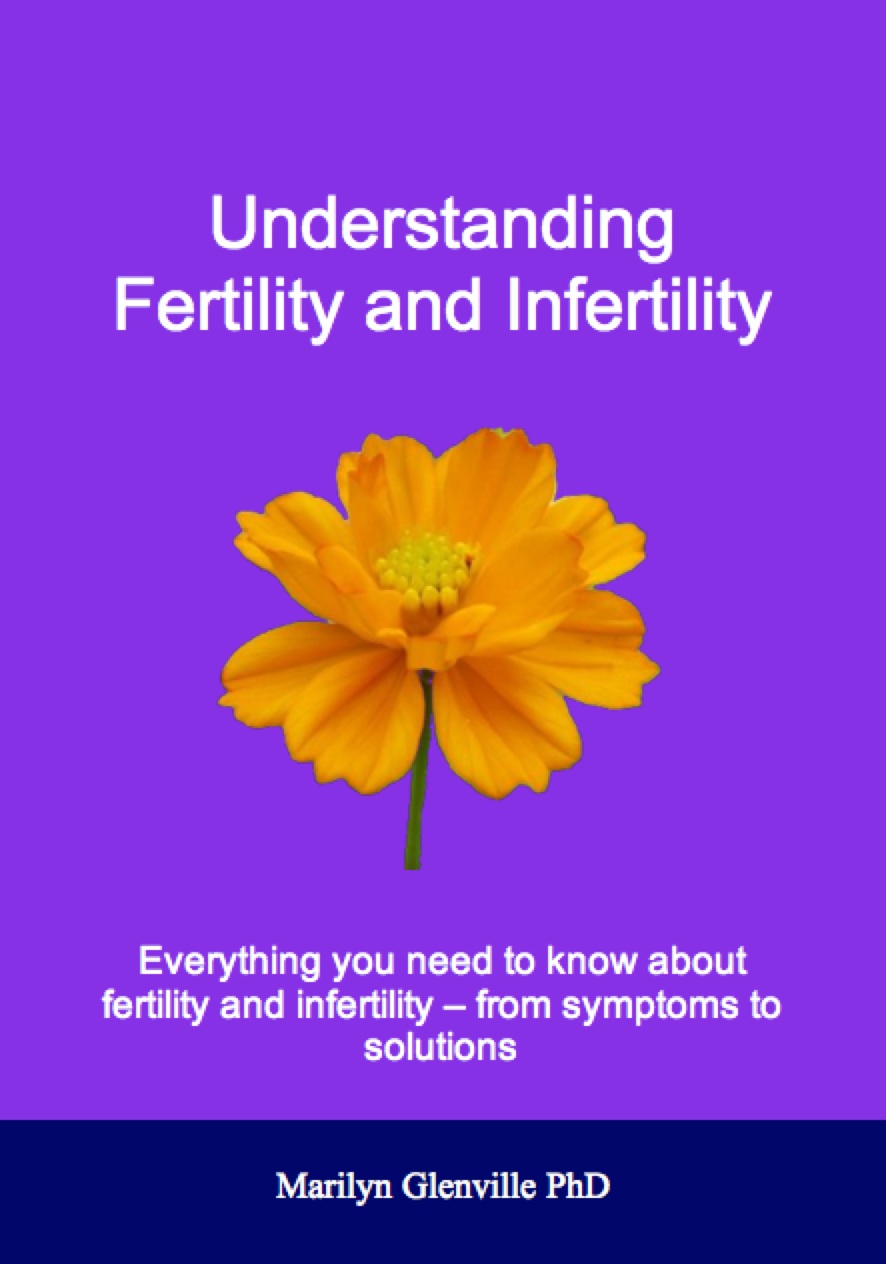
The section above forms part of a larger ebook on Infertility.
In the rest of the ebook you will learn what the medical approaches to Infertility are and how to combine them with the natural approach. This is called Integrated Medicine and is the way that healthcare of the future is moving towards. You will also learn what medical tests will give you an accurate diagnosis of your condition and if you really need to have them. The medical treatments for Infertility are then examined which can include looking at either drugs or surgery. Each treatment is then discussed and the pros and cons of the options explained. The Integrated Approach to Infertility is considered in some detail so that if appropriate you can know how to combine the best of both conventional and natural medicine.
At the end of the ebook is a practical step by step summary of what you can do to help yourself.
If you would like to read the rest of this ebook click, Understanding Infertility ebook at The Natural Health Practice and you will be given details of how you can download the whole ebook.
